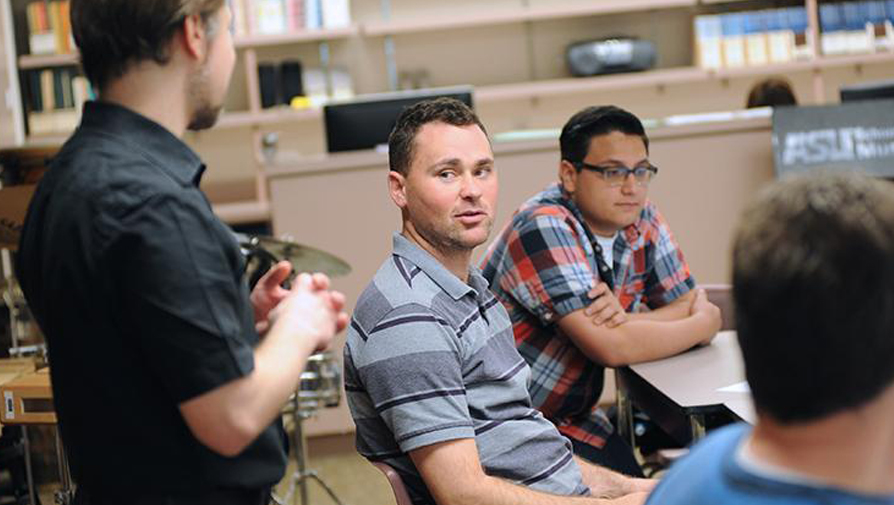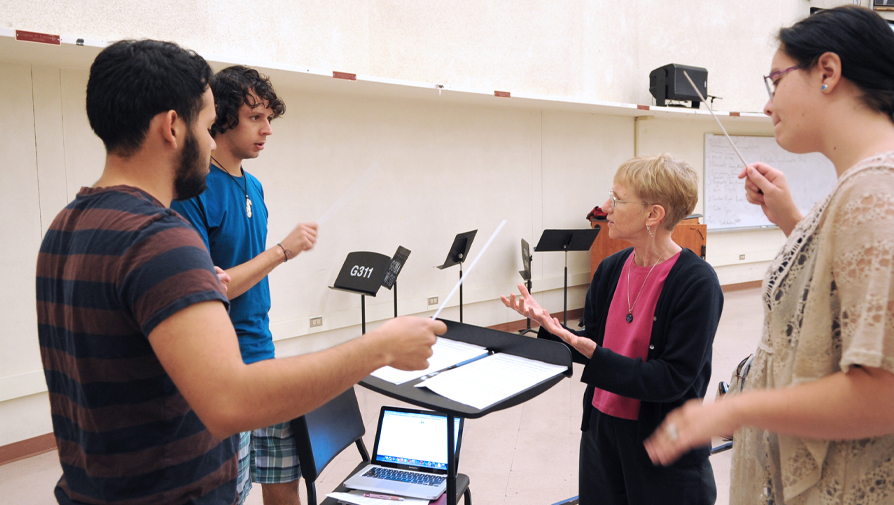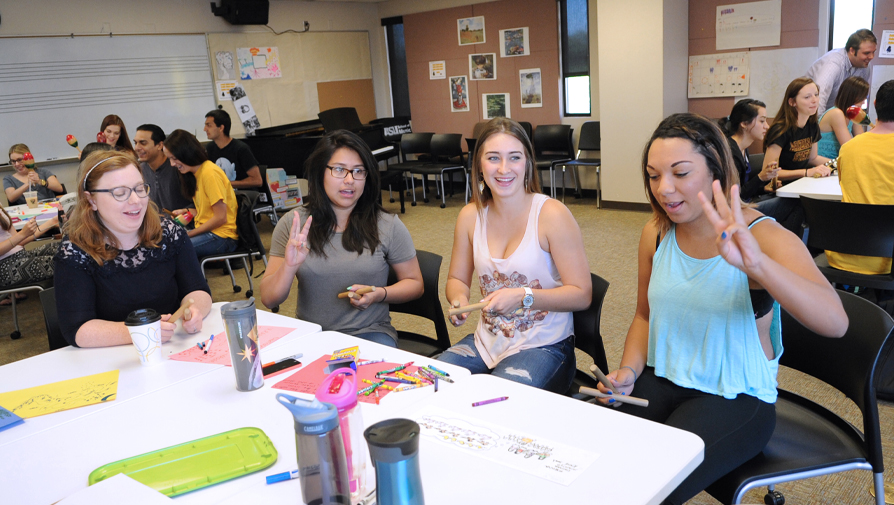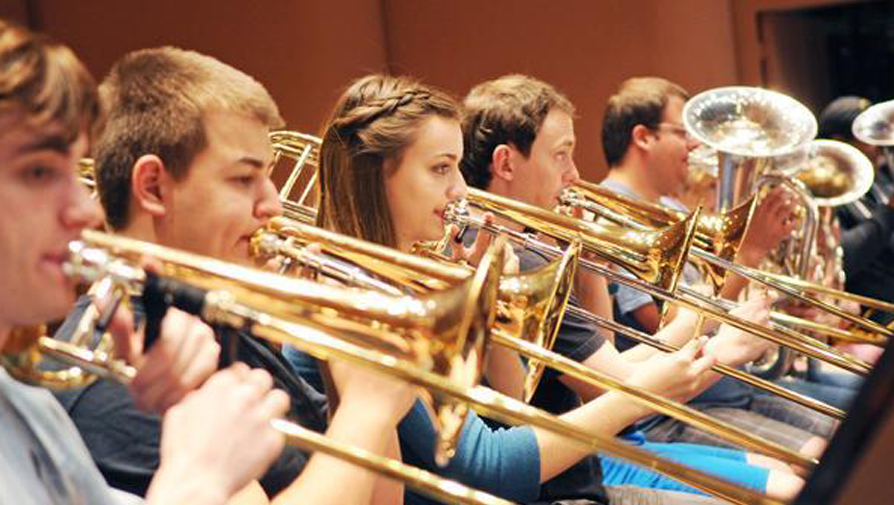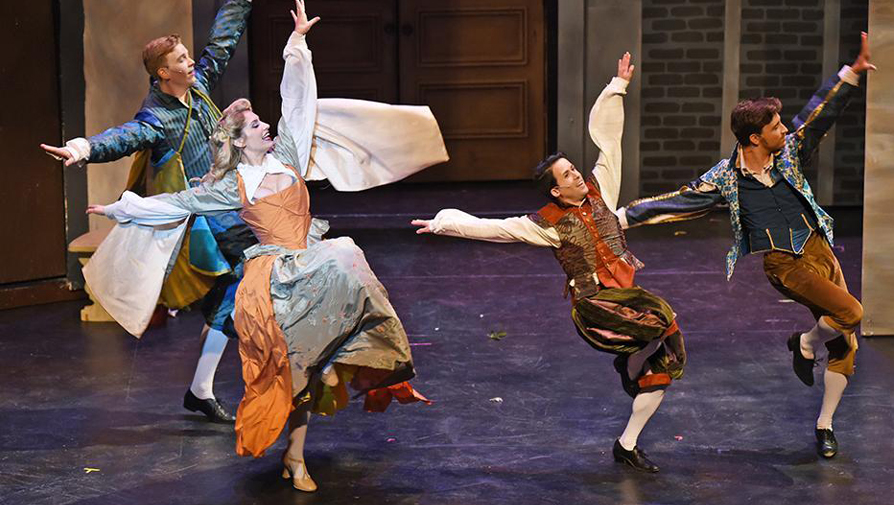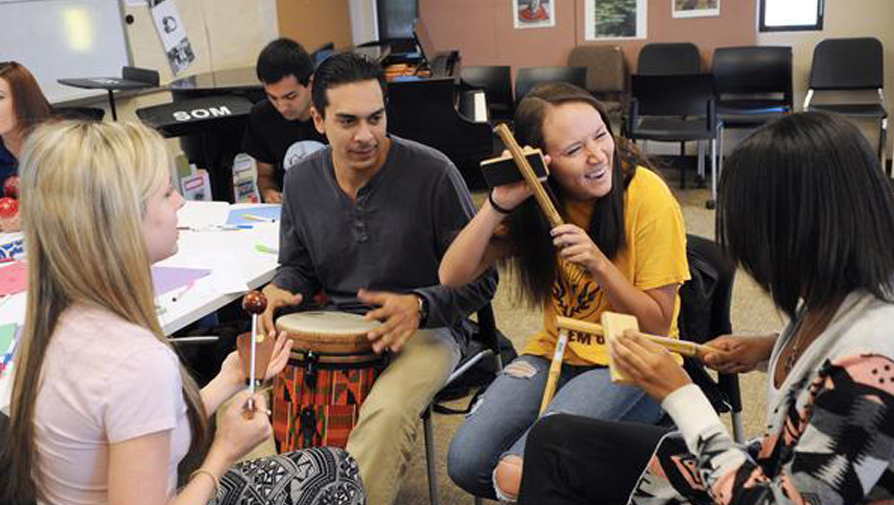
A degree in Music Learning and Teaching
Make a difference in the lives of students and communities.
The Music Learning and Teaching program in the ASU School of Music, Dance and Theatre is one of the most innovative in the U.S. Our degree programs emphasize five core principles intended to prepare students for successful careers as leaders in music teaching and learning:
Flexible Musicians appreciate and seek deep knowledge and skills to articulate music literacies in and outside of their own community, abilities, and understandings. This includes but is not limited to thinking expansively and creatively about what it means to be a musician and the varied ways people can be musical, navigating among multiple musics, musical practices, musical cultures, or musical traditions, being musical in numerous settings and can learning how to engage, and adapting in real-time or over time as they learn and grow. Flexible musicians work to figure it out. They are becoming and always learning.
Innovative Practitioners are principled and entrepreneurial. They question “the way things have always been done” or “the way things are” and seek new and more transformative ways to engage music teaching and learning. They explore possibilities and ask “what if?” They plan, respond, and adapt as needed. They make interesting connections, seek information, and act. In response to the needs of their students and the challenges that sit on the horizon, innovative practitioners aim to design, update, modify, or transform aspects of their practice and their programs.
Inquisitive Thinkers are curious about and seek out ways to attend to the needs of their students, community, and profession broadly. From wanting to know more about the pieces they are performing with their students to wondering why we do things a certain way, inquisitive thinkers apply a wide range of resources to problem-solve on their own (i.e., internet, community partnerships, blogs, podcasts and professional development). Inquisitive thinkers demonstrate curiosity and ask insightful questions of themselves, of others, and of the world around them. They are not satisfied with "what is," "what has been," or "what works,” and reflect on "why?" "for what purpose," "to what end," "for whom," and "what could be?" They desire opportunities to advance their knowledge, skills, and ability to impact change.
Community Leaders use their position, power, and resources to address the needs and interests of their communities. They also seek to understand, connect, and collaborate with their communities on various levels—within the classroom, school, school district, city/town, state, and region—seeking more to understand the community than to impose ideas upon it. While they are not afraid to ask questions or challenge the status quo, they know when to step up and step back. They do the work that is needed but also empower others to contribute and lead. They act responsibly, ethically, and equitably.
Equity for all is a core principle among music educators who consistently reflect on and aim to confront their position in the world while addressing issues and systems that impact their students’ lives in and outside the classroom. Equity and justice are salient features in everything they do, including positioning music as a force for good in the world. Those whose core beliefs include equity for all seek to understand and develop understandings about systemic and local issues that fund inequity and how these inequities show up in local-global contexts. They value differences and find ways to connect their community and musical identities with others’. Equity for all guides intentionality in addressing issues of access, representation, and power.
ASU music learning and teaching graduates make a difference in the lives of their students and communities.
(This program's name has changed from Music (Music Education) effective Fall 2020).
The Bachelor of Music in Music Learning and Teaching is an innovative 120-credit degree program leading to concurrent teacher certification in the state of Arizona (with reciprocity with other states through the Inter-State Agreement of NASDTEC). The BM in Music Learning and Teaching prepares students for current and future places of music engagement and learning through world-class Art of Teaching coursework, studio lessons and ensemble participation, and courses in music theory, history and musicianship. Lab courses, skill development in contemporary digital music learning and teaching, and internships with excellent pre-K–12 music educators ensure that ASU music learning and teaching graduates become the next generation of musical leaders in schools and communities. Learn more about professional licensure.
Post-degree teacher certification courses are available for individuals who hold an undergraduate degree and who seek pre-K–12 music certification. Post-degree certification students may enroll as non-degree graduate students or pursue certification simultaneously with a master’s degree by taking additional courses. Learn more about professional licensure.
The Master of Music in Music Learning and Teaching degree is designed for music educators, teaching artists and music professionals seeking new and expanded opportunities for career development in learning and teaching. Program flexibility affords students opportunities to customize degree pathways, advance their goals and develop musical, scholarly and leadership roles in their professional settings. Students in the master’s program develop their capacity to address pressing issues in music learning and teaching and contribute to professional dialogue. Full-time, part-time, digital commuter, summer study and concurrent teacher certification options are available. Learn more about professional licensure.
Professional development opportunities are available for educators, teaching artists, performance majors, community musicians and anyone who wants to advance their musicianship as well as their abilities to facilitate music learning and engagement. Workshops, short courses and action research are available for professional development clock hours (CEUs) at a lower cost than graduate credit. Those seeking graduate credit but not a degree can enroll as nondegree graduate students for any of our classes during fall, spring and summer semesters.
The PhD in Music Learning and Teaching is a transformative degree for musician-teacher-scholars who seek careers in musical and educational leadership. Music Learning and Teaching PhD students are immersed in an open, inclusive and multi-faceted community of dynamic partnerships, research and teaching collaborations and creative enterprise. Students work each semester with outstanding faculty on creative projects and initiatives that lead to independent and co-authored research and publication. PhD students have opportunities to diversify their thinking and further their goals by accessing internationally recognized faculty in other schools and colleges at ASU. PhD students complete the program with many possible career options and pathways ahead. Learn more about professional licensure.
ASU Music Learning and Teaching Summer Institute is an opportunity for people to develop and advance their musicianship and abilities to facilitate music engagement and learning in a vibrant community of teachers, teaching artists, community members, graduate students and undergraduate students. Summer offerings include one-week workshops, specialized clinics, music graduate courses, and Kodály and Orff certification courses. Learn more.
The Desert Skies Music Symposium on Research in Music Education is one of the longest continuously running independent research forums of its kind in the United States. The symposium is held in February of odd-numbered years and provides a forum for presentations of research about music learning and teaching in any context. The symposium is open to college and university faculty, pre-K–12 music educators, teaching artists and community music educators. Learn more.
The Consortium for Innovation and Transformation in Music Education conducts use-inspired research and collaborative initiatives to help music educators and those involved in arts, cultural, non-profit, and corporate sectors to create new possibilities for music engagement. We collaborate with those interested in advancing music education to develop music teaching, learning and engagement in current and future societies and to contribute to positive social transformations.
Music Learning and Teaching degrees
Music minors
Explore all areas of study
View all Music, Dance and Theatre areas of studies for other undergraduate, graduate and minors options.
